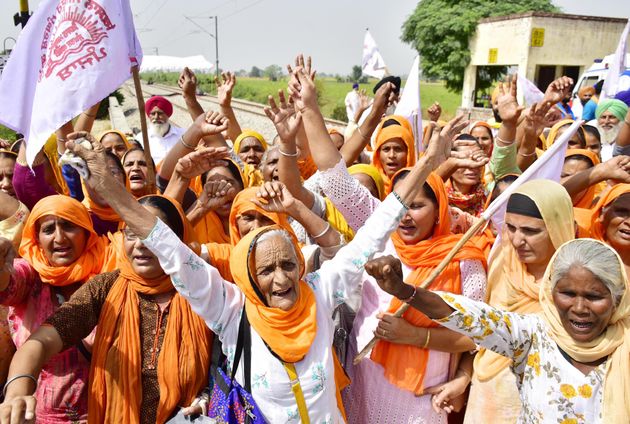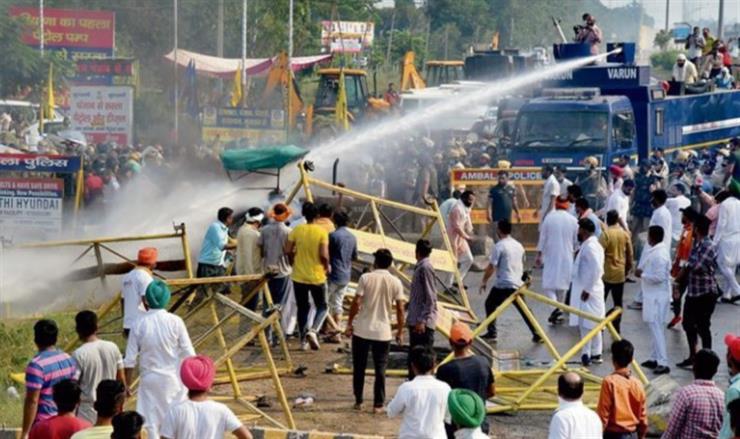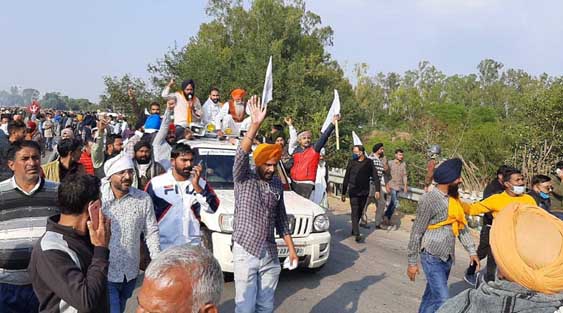BJP-led government of India faces a winter of peasant discontent
As thousands of Punjab farmers converge in Delhi and the Indian government succumbs to the pressure exerted by the Sikh peasantry in a well-coordinated and disciplined ‘Dilli Chalo’ campaign, political commentator Kumar Sanjay Singh traces the history of Punjab peasant agitations and explains how the recently passed farm bills have spelt the death-knell of the Bharatiya Janata Party in Punjab.
![As thousands of Punjab farmers converge in Delhi and the Indian government succumbs to the pressure exerted by the Sikh peasantry in a well-coordinated and disciplined ‘Dilli Chalo’ campaign, political commentator Kumar Sanjay Singh traces the history of Punjab peasant agitations and explains how the recently passed farm bills have spelt the death-knell of the Bharatiya Janata Party in Punjab. Passage of the three farm bills in the Parliament on 20 and 22 September—the Farmers Produce Trade and Commerce (Promotion […]](https://www.theworldsikhnews.com/wp-content/uploads/2020/11/Punjab-farmer-march-360x266.jpg)
Passage of the three farm bills in the Parliament on 20 and 22 September—the Farmers Produce Trade and Commerce (Promotion and Simplification) Bill 2020, the Farmers (Empowerment and Protection) Agreement on Price Assurance and Agricultural Services Bill 2020 and the Essential Commodities (Amendment) Bill 2020–has witnessed an intense peasant movement in Punjab. 31 farmers’ organisations have completely closed off the state: trains were stopped, toll plazas remain closed, Reliance’s malls and petrol pumps were shut and Reliance-owned Jio’s SIM cards are being boycotted.
Till now all attempts to cajole or pressurize the peasantry to withdraw it’s agitation have failed. Infact, the BJP finds itself isolated in Punjab. The fury of peasant agitation forced it’s oldest ally, the Akali Dal to withdraw from the NDA. On 20 October, the Punjab government passed three bills to counteract the laws introduced by the Centre, with the support of the Akali Dal and AAP. Now that the peasant movement has reached Delhi, the BJP led NDA government is confronted with the winter of peasant discontent.

To understand why the peasantry is so furious at the farm bills and why the central government has failed in tameing the agitation it will be worthwhile to understand the legacy of peasant movement in Punjab politics and the roots of peasant anxiety with the farm bills.
Peasant movements have been a powerful feature of politics in Punjab ever since the introduction of commercial agriculture during colonial period.
The peasant movements in Punjab have developed through distinct phases.

During the British colonial rule peasant movements emerged to resist the colonial government’s attempt to enhance land revenue and increase tax was in the form of canal tax.
In the princely state of Punjab peasants agitated to secure land which was seized by the combine of landlords and officials. The tenants refused to pay the batai or share rent to the landlord.

In the canal colonies agitation of 1907, Punjab peasantry was mobilised by leaders of the stature of Sardar Ajit Singh, an uncle of Shaheed-e-Azam Bhagat Singh. Sardar Ajit Singh organized the Pagadi Samhaal Jatta movement–agitation by Punjabi peasants against anti-farmer laws known as the Punjab Colonisation Act 1906 and administrative orders increasing water rate charges. Again in 1924 Punjab peasants successfully fought an agitation against the water rate.
Contradictions within this feudal agrarian system led to peasant mobilisations over tenurial rights, largely under the Kisan Sabha of the Communist Party.The Kisan Sabha movement in 1930s mobilised the peasantry on the issues of water rate and land revenue. Kisan Sabha led agitations culminating in the Land Ceiling Act iin the post-independence period.

Introduction of new farm technology and the consequent monetisation of agricultural activities under the ‘green revolution’ signalled the second phase of agrarian transformation. Unequal terms of trade between rural and urban sectors became the major contradiction characterising this phase, and farmers’ movements arose seeking redressal of this discrimination. MSP regime was a result of this phase of agitation.
The latest phase of agrarian struggle is to secure the security net of MSP. Peasants in Punjab are aware of the detrimental effects of absence of MSP, on interests of the peasantry.

In Punjab, there is 100% government procurement at MSP for wheat and paddy. But it is not the case with crops like maize, for which the Centre announces MSP every year, but there is hardly any government purchase at that rate in the state.
For crops where there is no assured government purchase even after the announcement of MSP in the state, farmers have no option but to sell their produce in the open market at much lower prices.
This explains why peasants from Punjab are up in arms against the Centre’s new farm laws and remain firm on their demand for the rollback of the contentious laws.

It is pertinent to underscore that MSP is a life and death question for peasants from Punjab. While green revolution transformed Punjab into the bread basket of India, it also transformed agriculture from a labour intensive to a capital intensive process. In the absence of adequate formal credit facility there’s a significant dependence of agriculture on private institutions and individuals for credit. The resultant indebtedness is the most important reason for the distress of middle and marginal peasants in Punjab.
It is urgent that government recognizes this necessity of the support of MSP for the viability of the agrarian production in Punjab. Destabilizing the sector which even now is the largest source of employment isn’t prudent economically speaking.
The Government of India can underestimate the impending agrarian crisis to it’s own peril. The emerging crisis and peasant angst against the undermining of the MSP regimen would be akin to igniting a matchstick that lit a prairie fire.
 Kumar Sanjay Singh is Associate Professor in the Department of History at the Swami Shraddhanand College, University of Delhi with specialisation in Mutations in Indian State formation post-1947, Extraordinary laws especially Internal Security Legislations and Human Rights with special focus on North-east India and Adivasi society.
Kumar Sanjay Singh is Associate Professor in the Department of History at the Swami Shraddhanand College, University of Delhi with specialisation in Mutations in Indian State formation post-1947, Extraordinary laws especially Internal Security Legislations and Human Rights with special focus on North-east India and Adivasi society.

4 thoughts on “BJP-led government of India faces a winter of peasant discontent”